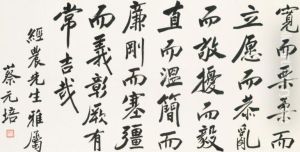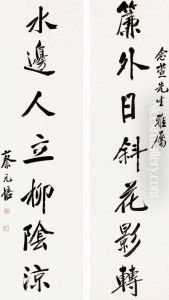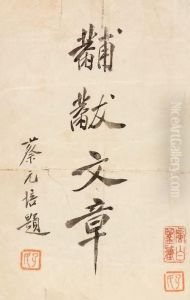Yuanpei Cai Paintings
Yuanpei Cai, also known as Cai Yuanpei, was a Chinese educator, intellectual, and reformer, rather than an artist in the traditional sense of visual arts. Born on January 11, 1868, in Shanyin (now Shaoxing), Zhejiang Province, China, Cai became a key figure in transforming Chinese education and intellectual thought during the early 20th century.
Cai’s early education was steeped in classical Chinese texts, but he later became interested in Western thought and science. After passing the highest level of the traditional Chinese civil service examinations, he served in various government positions. However, his career took a significant turn after the Boxer Rebellion in 1900. Disillusioned with the Qing Dynasty's inability to fend off foreign powers and modernize the nation, Cai went abroad to study in Germany, where he was exposed to progressive educational models and Western philosophy.
Returning to China in 1905, Cai became involved in the reform movements against the Qing Dynasty and played an active role in the establishment of the Republic of China in 1912. He was appointed the Minister of Education but resigned due to the Beijing government’s failure to support educational reforms. Cai’s most notable contribution to Chinese education came with his leadership of Peking University (Beida) from 1917 to 1926. As its chancellor, Cai transformed the institution into a center for progressive thought and political activism, promoting academic freedom, modern curricula, and comprehensive reforms. Under his guidance, the university became a hub for the New Culture Movement, which sought to challenge traditional Confucian values and promote democracy, science, and literary reform.
Despite his advocacy for liberal education, Cai's tenure at Peking University was marked by political turmoil and student activism, including the May Fourth Movement in 1919, which he supported. Cai believed that education was the key to China's regeneration, emphasizing the need for moral education alongside intellectual and physical education.
After his tenure at Peking University, Cai continued to be involved in educational initiatives and cultural affairs. He founded the Academia Sinica in 1928, which became the national academy of the Republic of China, dedicated to research in the sciences and humanities.
Cai Yuanpei passed away on March 5, 1940, in Hong Kong. His legacy as an educational reformer and advocate for progressive thought remains influential in China's modern history, and he is remembered as a pioneer who sought to bridge Eastern and Western philosophies and methodologies in the quest for a modern and democratic Chinese society.



